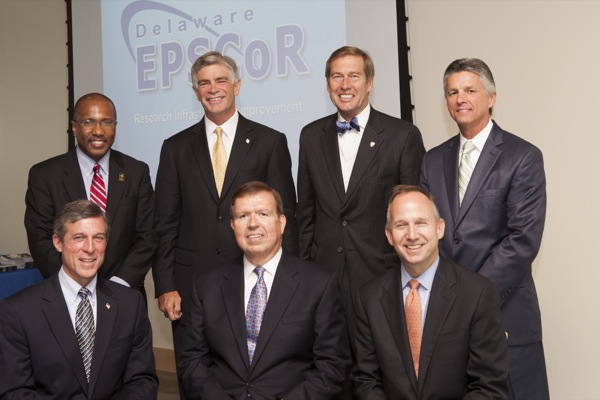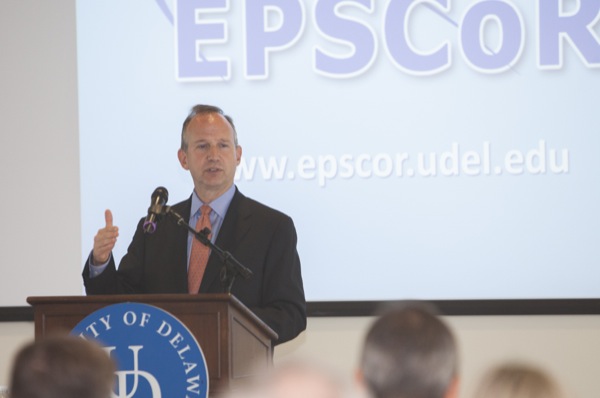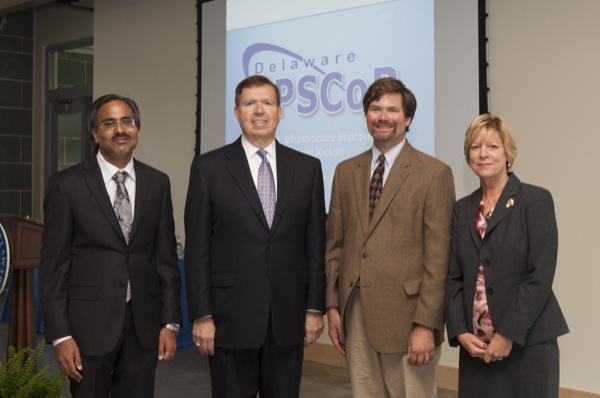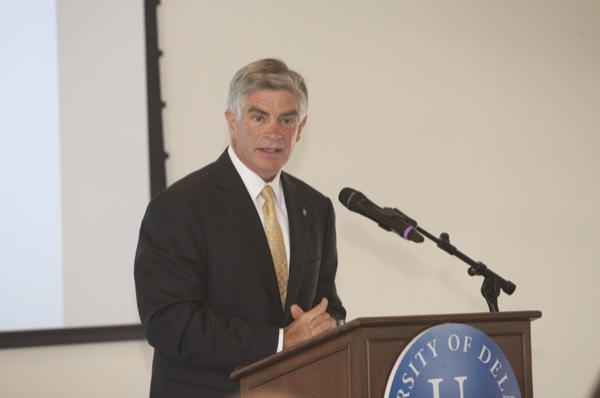


EPSCoR kickoff
State leaders celebrate the power of partnership
1:36 p.m., Sept. 6, 2013--Participants in Delaware’s Experimental Program to Stimulate Competitive Research (EPSCoR) celebrated the launch of a new five-year, $24-million grant that aims to further expand and enhance environmental research capability in the state in a ceremony on Aug. 29.
EPSCoR is a program sponsored by the National Science Foundation (NSF) that supports states’ efforts to increase their research competitiveness through improvements in infrastructure, including facilities, programs and personnel. There are currently 31 states and territories designated as NSF EPSCoR jurisdictions.
Research Stories
Chronic wounds
Prof. Heck's legacy
The new grant is the third EPSCoR Research Infrastructure Improvement (RII) grant awarded to Delaware since its designation as an EPSCoR state in 2003. The award will be divided among four partner institutions -- the University of Delaware, Delaware State University (DSU), Wesley College and Delaware Technical Community College (DTCC).
Four million dollars of the overall grant will be contributed as matching funds by the state of Delaware over the next five years. Delaware Gov. Jack Markell was on hand at the event in UD’s new Interdisciplinary Science and Engineering Laboratory (ISE Lab) to offer his congratulations and to express his hope that the environmental focus of Delaware EPSCoR will help the state address looming problems.
“The impacts of climate change are going to affect every Delawarean, every Delaware industry, especially agriculture, tourism, manufacturing. We’ve got to be very prepared and take very thoughtful and cost-effective steps today to make sure we’re ready for the changes ahead,” Markell said. “When you look at the research topics that EPSCoR here is focused on, you’ve got to believe that this grant is one of the most important investments that we could collectively be making. The EPSCoR focus on climate, energy and water very much aligns with our own priorities and with our most pressing needs.”
U.S. Rep. John Carney also spoke, remarking that he was gratified to see the program, which he was instrumental in initiating 10 years ago as lieutenant governor of Delaware, reach this new milestone.
Leaders from all four Delaware EPSCoR partner institutions — President Patrick Harker of UD, President Harry Williams of DSU, President William Johnston of Wesley and Executive Vice President Mark Brainard of DTCC — described how the EPSCoR program has catalyzed growth at their institutions over the past 10 years and what their plans are for the next five years of funding.
Delaware EPSCoR Director Don Sparks, S. Hallock du Pont Chair in Soil and Environmental Chemistry at UD and director of the Delaware Environmental Institute (DENIN), presented the program’s overall accomplishments to date, including
- Building a statewide, interdisciplinary, collaborative network of nearly 200 people that closely links the four partner institutions;
- Increasing the depth and breadth of the environmental faculty working in Delaware by 15 new positions;
- Forming interdisciplinary and inter-institutional working groups and strengthening partnerships with state agencies and industries;
- Establishing five new entities at the partner institutions that serve to focus joint efforts: the Delaware Environmental Institute at UD, the Center for Integrated Biological and Environmental Research at DSU, the Center for Science, Ethics, and Public Policy at UD, the Office of Economic Innovation and Partnerships at UD, and the Center for Industry Research and Workforce Alignment at DTCC;
- Establishing an entrepreneurial ecosystem across the state that supports new business ventures and addresses the needs of Delaware industries for appropriately trained workers;
- Transforming the way undergraduates are trained in technical fields across the network, with an emphasis on hands-on research experiences, providing an educational pipeline for students interested in pursuing science, technology, engineering or math degrees; and
- Increasing the availability of state-of-the-art equipment through support of core facilities — central locations where researchers can share highly expensive and specialized equipment.
“Taken together, all these achievements have helped Delaware increase our research competitiveness over the past five years,” Sparks said. “There are many ways to measure this, but one way to look at it is research funding. By 2008, over the first four years of the program, researchers in the EPSCoR network had brought in $26 million in external funding to Delaware. Since then, by the end of our subsequent RII grant this year, that number has grown to $68 million.”
Sparks enumerated the research themes that will be addressed with the new grant, including the effect of sea level rise on contaminant mobility and cycling, coupled land use and climate change impacts on water and natural systems, the development of small sensors to provide data for environmental monitoring and forecasting systems, and innovations in renewable energy.
“But in addition to pulling together an amazing group of dedicated scientists and engineers, we are doing something else that is truly innovative here in Delaware,” Sparks said. “We are integrating into each of our research themes the work of social scientists and humanities scholars — economists, sociologists, policy specialists, ethicists and others who can help us ensure that the solutions we come up with to meet our environmental challenges are fair, viable, and workable for real human beings in a complex and diverse society.”
Capturing the economic and societal benefits of discovery research is one of the key objectives of the EPSCoR program, which recognizes that technological innovation is a driver of economies at the state and national levels.
“With this new grant, I know we’re going to do what Delaware does best, which is to come together, as we have today, to solve these big problems,” Markell said. “That is the spirit of partnership. But it’s more than just rhetoric. It is a tradition of action in this state. And I think this particular grant will have huge potential implications for Delaware, both for our environment and our economic development as well.”
Article by Beth Chajes
Photos by Ambre Alexander











